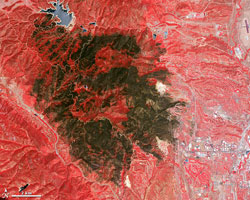Wildfires Linked to Climate Change
 NASA
NASAWildfires have been raging in Colorado throughout June and July, and the Waldo Canyon Fire, which has burned more than 18,000 acres and counting and destroyed 350 homes, is the most destructive wildfire in the state’s history. Most news outlets have neglected to report the connection between the increasing frequency in these fires and the climate change conditions that allow them to occur. With each one to two degree increase in global temperatures, there is a two to four time increase in loss of land in the western U.S. due to wildfires.
According to the Natural Resources Defense Council, 2.4 million acres of land has already been burned in the United States and 76% of the continental U.S. is unusually dry this year. It is the hottest year on record with 86 all-time heat records broken. There have been 30,000 wildfires to date with over two months left in the season.
Only 3% of news stories by all major media outlets about wildfires in the western U.S. mention the important connection between human-caused climate change and drier weather conditions. Instead, the news stories focus only on the extent of the fires and their impact on local communities.
Critics argue that increased wildfires are due more to the bark beetle infestation—which has increased the amount of extremely flammable dead wood—and to an increase in forest density. But Craig Allen, a research ecologist for the U.S. Geological Survey, told the Colorado Independent: “We know now that it’s not just dry conditions that drive fires. There’s enough data that show fires are very clearly linked to warming – warming that’s been going on throughout this region for years.”
More than 35,000 people have been evacuated so far in Colorado, though rain and cooler weather have brought an end to extreme fire conditions in the 64 Colorado counties that have been impacted. The burned land left behind by the fires can be seen clearly on NASA satellite images. And while fires have been–or are being–contained, the wildfire season is far from over.

